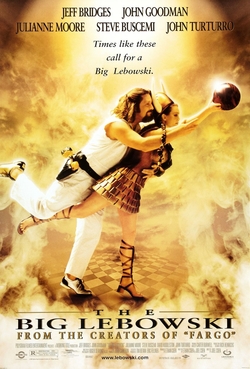
The Tao Te Ching is a Chinese classic text and foundational work of Taoism traditionally credited to the sage Laozi, though the text's authorship, date of composition and date of compilation are debated. The oldest excavated portion dates to the late 4th century BC, but modern scholarship dates other parts of the text as having been at least compiled later than the earliest portions of the Zhuangzi, the other foundational text of Taoism.

The Big Lebowski is a 1998 American independent crime comedy film written, directed, produced and co-edited by Joel and Ethan Coen. It stars Jeff Bridges as Jeffrey "The Dude" Lebowski, a Los Angeles slacker and avid bowler. He is assaulted as a result of mistaken identity, then learns that a millionaire, also named Jeffrey Lebowski, was the intended victim. The millionaire Lebowski's trophy wife is supposedly kidnapped, and millionaire Lebowski commissions The Dude to deliver the ransom to secure her release. The plan goes awry when the Dude's friend, Walter Sobchak, schemes to keep the ransom money for the Dude and himself. Sam Elliott, Julianne Moore, Steve Buscemi, John Turturro, Philip Seymour Hoffman, Tara Reid, David Thewlis, Peter Stormare, Jon Polito, and Ben Gazzara also appear in supporting roles.

Taoism or Daoism is a diverse tradition indigenous to China, variously characterized as both a philosophy and a religion. Taoism emphasizes living in harmony with the Tao—generally understood as being the impersonal, enigmatic process of transformation ultimately underlying reality. The concept originates in the Chinese word 道, which has numerous related meanings: possible English translations include 'way', 'road', and 'technique'. Taoist thought has informed the development of various practices within the Taoist tradition and beyond, including forms of meditation, astrology, qigong, feng shui, and internal alchemy. A common goal of Taoist practice is self-cultivation resulting in a deeper appreciation of the Tao, and thus a more harmonious existence. There are different formulations of Taoist ethics, but there is generally emphasis on virtues such as effortless action, naturalness or spontaneity, simplicity, and the three treasures of compassion, frugality, and humility. Many Taoist terms lack simple definitions and have been translated in several different ways.
In various Chinese religions and philosophies, the Tao or Dao is the natural way of the universe, whose character one's intuition must discern to realize the potential for individual wisdom, as conceived in the context of East Asian philosophy, religion, and related traditions. This seeing of life cannot be grasped as a concept. Rather, it is seen through actual living experience of one's everyday being. Its name derives from a Chinese character with meanings including 'way', 'path', 'road', and sometimes 'doctrine' or 'principle'.

Laozi, also romanized as Lao Tzu and various other ways, was a semi-legendary ancient Chinese philosopher, author of the Tao Te Ching, the foundational text of Taoism along with the Zhuangzi. Laozi is a Chinese honorific, typically translated as "the Old Master". Modern scholarship generally regards his biographical details as invented, and his opus a collaboration. Traditional accounts say he was born as Li Er in the state of Chu in the 6th century BC during China's Spring and Autumn period, served as the royal archivist for the Zhou court at Wangcheng, met and impressed Confucius on one occasion, and composed the Tao Te Ching in a single session before retiring into the western wilderness.

Zhuang Zhou, commonly known as Zhuangzi, was an influential Chinese philosopher who lived around the 4th century BCE during the Warring States period, a period of great development in Chinese philosophy, the Hundred Schools of Thought. He is credited with writing—in part or in whole—a work known by his name, the Zhuangzi, which is one of two foundational texts of Taoism, alongside the Tao Te Ching.

The Tao of Pooh is a 1982 book written by Benjamin Hoff. The book is intended as an introduction to the Eastern belief system of Taoism for Westerners. It allegorically employs the fictional characters of A. A. Milne's Winnie-the-Pooh stories to explain the basic principles of philosophical Taoism. The book was on the New York Times bestseller list for 49 weeks. Hoff later wrote The Te of Piglet, a companion book.

Jeff Dowd is an American film producer and political activist.
Lebowski Fest was an annual festival that began in 2002 in Louisville, Kentucky, celebrating the 1998 cult film The Big Lebowski by Joel Coen and Ethan Coen and was last celebrated in 2018. In addition to its home city of Louisville, Lebowski Fest has been held in Milwaukee, New York, Las Vegas, Los Angeles, Austin, Seattle, Chicago, San Francisco, Portland, London, Boston, New Orleans and Pittsburgh.
Taoist music is the ceremonial music of Taoism. The importance of music in Taoist ceremony is demonstrated by revealing how central beliefs are reflected through elements of music such as instrumentation and rhythm. Expression of spiritual beliefs through music enables followers of Taoism to enhance their path to enlightenment.

Taoism or "Do" is thought to be the earliest state philosophy for the Korean people. However, its influence waned with the introduction of Buddhism during the Goryeo kingdom as the national religion and the dominance of neo-Confucianism during the Joseon dynasty. Despite its diminished influence during those periods, it permeated all strata of the Korean populace, integrating with its native animism as well as Buddhist and Confucian institutions, temples, and ceremonies. The Taoist practice in Korea developed, somewhat in contrast to China, as an esoteric meditative practice in the mountains taught by the "mountain masters" or "mountain sages".
The Huahujing is a Taoist work, traditionally attributed to Laozi.

In the study of comparative religion, the East Asian religions or Taoic religions, form a subset of the Eastern religions. This group includes Chinese religion overall, which further includes ancestor veneration, Chinese folk religion, Confucianism, Taoism and popular salvationist organisations, as well as elements drawn from Mahayana Buddhism that form the core of Chinese and East Asian Buddhism at large. The group also includes Japanese Shinto, Tenrikyo, and Korean Muism, all of which combine Shamanistic elements and indigenous ancestral worship with various influences from Chinese religions. Chinese salvationist religions have influenced the rise of Japanese new religions such Tenriism and Korean Jeungsanism; as these new religious movements draw upon indigenous traditions but are heavily influenced by Chinese philosophy and theology. All these religious traditions generally share core concepts of spirituality, divinity and world order, including Tao ('way') and Tian ('heaven').

Alex Anatole is a Taoist priest, teacher, and writer. He directs centers of Taoist studies in Europe, Australia and the U.S.
The history ofTaoism stretches throughout Chinese history. Originating in prehistoric China, it has exerted a powerful influence over Chinese culture throughout the ages. Taoism evolved in response to changing times, with its doctrine and associated practices being revised and refined. The acceptance of Taoism by the ruling class has waxed and waned, alternately enjoying periods of favor and rejection. Most recently, Taoism has emerged from a period of suppression and is undergoing a revival in China.

Richard "Von" White is an abstract expressionist artist. Born Richard Elis Blair White, on the island of Jamaica in 1951, to a family of prominent businessmen and founders of the town Oracabessa. "Von" is the stage name of Richard White, an artist who specialises in pastel tropical scenes inspired by nature and the female form.

Daode Tianzun, also known as Taishang Laojun is a high Taoist god. He is the Taiqing which is one of the Three Pure Ones, the highest immortals of Taoism.
The following outline is provided as an overview of and topical guide to Taoism:
Taoist art relates to the Taoist philosophy and narratives of Lao-tzu that promote "living simply and honestly and in harmony with nature."
Taoist philosophy also known as Taology refers to the various philosophical currents of Taoism, a tradition of Chinese origin which emphasizes living in harmony with the Dào. The Dào is a mysterious and deep principle that is the source, pattern and substance of the entire universe.












